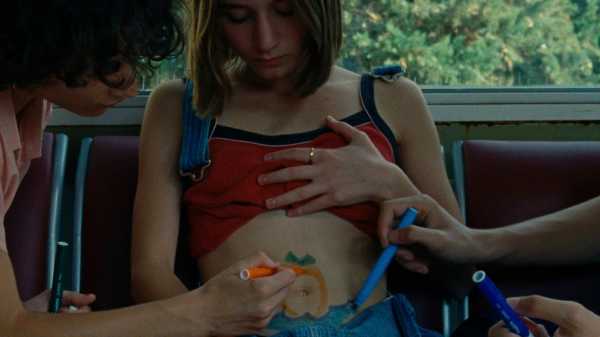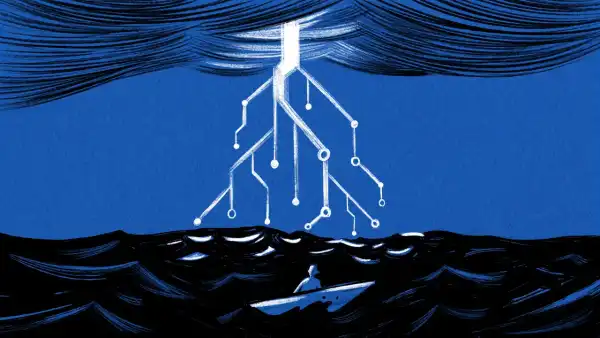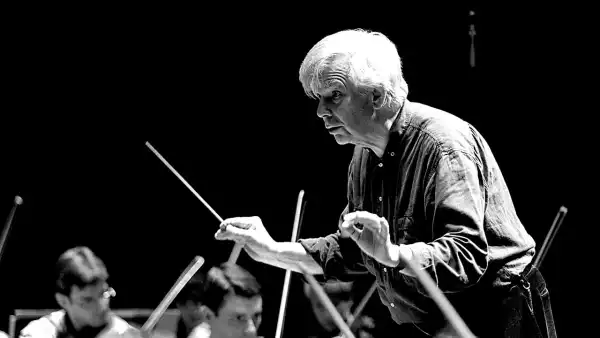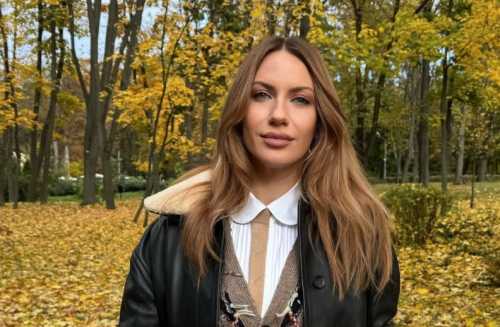
“The past few years we hear, in many countries, voices that come straight from the medieval past, saying what a female body should or shouldn’t do,” Sofia Georgovassili said.
A deer runs by, passing in and out of view a few times before everything becomes a blur. The image takes a moment to understand: the deer is face to face with us, so close to the camera lens it’s out of focus. Small, red-brown roe deer have the ability to postpone pregnancies until spring. Something about that captured the interest of the director, producer, and writer Sofia Georgovassili, who sees in it a juxtaposition to a part of human nature. “We can’t decide when we want something or not, or to pause it until the time is right,” she told me. Her short film “Memoir of a Veering Storm” opens with the scene of the deer, then cuts away to a teen-age girl in blue overalls.
The film follows fifteen-year-old Anna on what looks to be a normal morning in a leafy city, somewhere in Greece. Her mother drops her off at school. She walks into the building, through a corridor and across an empty basketball court—then jumps the fence, escaping the halls of adolescence. She continues on, determined. Accompanied by her boyfriend and a friend, she heads for an abortion clinic. There, the corridors mirror the school’s, but, in this place full of adults, the teen-agers are noticeably out of place, doodling on Anna’s stomach with colored markers as they discuss possible names for what they call the “roe kid.” Outside, a Mediterranean cyclone looms; we hear radio warnings and sounds of the coming storm.
The New Yorker Documentary
View the latest or submit your own film.

Georgovassili presents this as a coming-of-age story. “Memoir of a Veering Storm” is based on the real-life experience of Georgovassili’s friend, who accompanied his girlfriend to an abortion without her parents’ knowledge. Georgovassili learned this story years ago; she said that she felt the theme has continued to resonate because the stigma around abortion, not only in Greece but around the world, hasn’t changed. During production, she interviewed several teen-agers, including the actors. All of them said that they would not tell their parents if they had an abortion. “It’s in our life. It can happen to everyone. But, even if they feel O.K. about it, society is not. Unfortunately, the past few years we hear, in many countries, voices that come straight from the medieval past, saying what a female body should or shouldn’t do,” Georgovassili said. It’s striking that the entire story takes place within a school day, with Anna’s journey into adulthood limited to a brief, secret excursion. In turn, that coming-of-age narrative becomes cyclical and trapping, bringing Anna and ourselves back to where we began.
The production of the fourteen-minute film took three years. Early in the process, the script was rejected from public funding, and Georgovassili struggled to find locations open to filming the story. “It didn’t cross my mind that doing a film [about] an abortion in 2020 would be the reason,” Georgovassili said. “I understood it a bit later. . . . The answer was no, after they would hear what the film was about.” Eventually, a public school allowed them to shoot for a short time, as long as they stayed out of classrooms. It took a year to get approval to film the clinic scenes, which were shot in a public hospital. By then, Georgovassili had decided—like the young woman in her film—not to disclose too much about her plans. “I was writing more vaguely about the synopsis and the story. I hid some elements of the story. A year later, they told me yes,” she said. The crew made quick work while they were allowed on location, and shot the film in two and a half days.
Still, during those few days, a storm threatened production. Although the weather dissipated, it was written into the script, lending the film its title. The unplanned cyclone matched the atmosphere of the story, in which the social views around abortion and women’s bodies hover over a girl’s transition into adulthood. It reminds us that some storms pass unseen.
Sourse: newyorker.com






